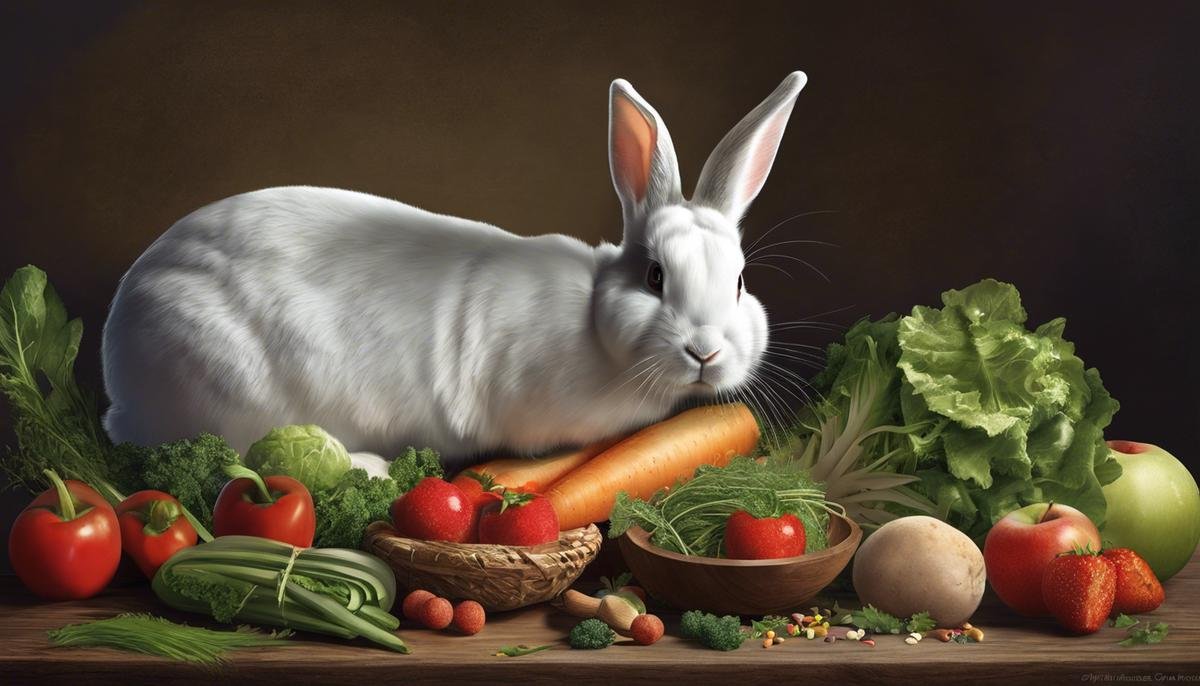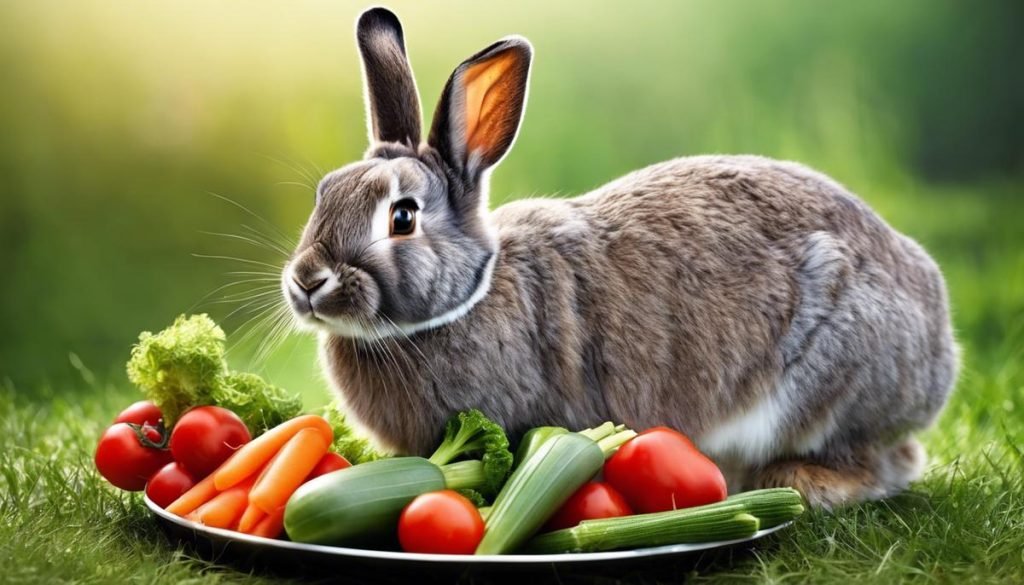Understanding the dietary preferences and requirements of rabbits can be a fascinating journey into nature’s nutritional plans for these adorable creatures. Understanding what constitutes a rabbit’s regular diet, both in the wild and in domestic settings, can help us provide them with a nutritious and balanced menu. Our focus will also be cast on an unexpected food item – honey. Although this sweet, sticky substance is a favorite among many species, does it find favor in the rabbit palate? By diving into the dietary behaviors of these curious creatures, and by getting scientific insight on their noted interactions with honey, we may just find some surprising answers.
Understanding the Basic Diet of Rabbits
Guide to Understanding Your Rabbit’s Diet
Understanding the dietary needs of a rabbit is crucial to their overall health and well-being. Lucky for us, this doesn’t have to be rocket science. Here’s a primer on the typical rabbit diet.
The cornerstone of every bunny’s diet is Hay. In fact, an adult rabbit’s diet should consist of about 80-90% hay. Timothy hay, orchard grass, or oat hay are great choices and all varieties offer different textures and flavors, keeping things interesting for these fuzzy creatures.
What makes hay so important, you ask? Well, it’s beneficial for two key reasons. Primarily, hay has the necessary fiber to aid in maintaining a rabbit’s complex digestive system. Secondly, its abrasive nature supports dental health – it helps grind down teeth that continually grow throughout a bunny’s life.
Next up, leafy greens and vegetables play an important role too. Rabbits love the taste and texture of fresh greens, and they contribute valuable vitamins and minerals. A bunny’s diet should consist of about 10-15% of these nutrient-rich veggies. Mix it up with a variety of leafy greens such as romaine, parsley, cilantro, endive, and radicchio. Some veggies, like bell peppers and zucchini, can be particularly enticing to a rabbit’s palate.
Finally, we arrive at the smallest but sweetest part of the diet, fruit and pellets. Pellets can be a good source of nutrients if given in moderation. On the other hand, fruits can double up as tasty treats while offering small amounts of nutrients. These constitute about 5% of the diet, with portions roughly equal to a teaspoon per 2 lbs of body weight.
Some of the safe fruit options include apples (without seeds), bananas, strawberries, pears, and plums. Pellets should ideally be Timothy hay-based, and avoid those with seeds, nuts, dyed pieces, and corn, which can be hard for a rabbit to digest.
In contrast, there are certain foods that should never find their way into a bunny’s bowl. These include onions, rhubarb, iceberg lettuce, and chocolate. These foods can cause serious digestive ailments and other health issues in rabbits.
There you have it, a simple guide to understanding your rabbit’s diet. Loaded with roughage, punctuated by veggies, and sweetened with a bit of fruit. It’s all about balance, variety, and moderation to keep the bunny hopping happily. Just remember – when introducing new foods in your rabbit’s diet, always do so gradually to avoid upsetting their sensitive digestive system. Happy feeding!

Interaction Between Rabbits and Honey
Article:
Diversifying a Rabbit’s Diet: The Honey Quandary
Among various queries that rabbit enthusiasts often grapple with, queries about the integration of honey in a rabbit’s diet is one that pops up frequently. Honey, nature’s liquid gold, is replete with antioxidants, and it’s known for its multitude of uses in human diets. But when it comes to our furry friends, does honey offer them the same nutritional punch, or does it rather serve as a detriment to their wellbeing? Here, we excavate the truth.
First off, it’s essential to learn what rabbits instinctively relish. In the wild, rabbits primarily eat grass, weeds, and a gamut of leafy greens. Their digestive systems are perfectly poised to extract nutrients from such food, thereby making their diets fiber-rich and low in sugars. Domestic rabbits need a comparable diet to live a healthy life.
Bringing us to the question you’re all probably impatiently waiting an answer to. Can rabbits have honey? The answer, in short, is a no. Despite the lauded benefits honey holds for humans, for rabbits it’s a different story. Their digestive systems aren’t designed to process the amount of sugar present in honey, which can lead to gastrointestinal issues, obesity, and even lethal cases of a condition known as Enterotoxemia.
Enterotoxemia, in the rabbit world, spells trouble. It is caused by a sugar-induced overgrowth of harmful bacteria in the gut, resulting in toxins that can adversely affect internal organs. A spoonful of honey today might seem harmlessly sweet, but it could trigger a domino effect culminating in this dangerous aility.
Then, you might wonder, ‘What about raw or organic honey?’ Irrespective of whether it’s raw, organic, or processed, honey is still high in sugar and not recommended for rabbits. Even if your bunny seems to enjoy the taste, it’s best to resist giving honey because of the potential health hazards mentioned above.
Instead, focus on feeding your rabbit healthy, safe, and easily digestible treats. Fruits like apples, pears, or strawberries could be a delightful change of pace for them, but use these sparingly as they contain natural sugars. Of course, remember to remove the seeds and stems!
Lastly, one might ask, ‘How do rabbits react to honey?’ In actuality, due to their sweet tooth, they may fall for the taste. But liking does not equate to safety or nutritional need. They may also develop a preference for sweet foods over the healthier ones, disrupting their overall diet. Strike a fine balance by choosing treats that align with their nutritional need, not just what tantilizes their tastebuds.
In the labyrinthine world of rabbit diets, it’s always best to stick to the basics of hay, vegetables, leafy greens, a small number of pellets, and the occasional fruit treat. Let honey remain a humans-only delight, as the utility of honey to rabbits falls sadly short when weighed against the potential risk. As passionate rabbit caregivers, their health and happiness should always be our top priority. Always remember, what’s sweet for us may not be sweet for them!

Feeding Alternatives to Honey for Rabbits
Delving deeper into the rabbit’s dietary alternatives – especially when focusing on sweet treats like honey – it’s essential to underline that our furry friends have their own unique nutritional requirements. Though honey might seem like a tempting treat, it’s a ‘no-go’ for our health-conscious hoppers. Fortunately, there are several other safe, delicious alternatives we can offer instead.
Regrettably, honey is something that rabbits should always avoid. It’s too high in sugar and can cause severe digestive problems leading to an overgrowth of harmful bacteria, leading to conditions like Enterotoxemia. Such health risks make honey an unsafe option, even in its raw or organic forms.
In the quest for safe, sweet substitutes, think about the fruits often favoured by rabbits. These natural treats are an excellent way to keep your pet’s sweet tooth satisfied without straying from their dietary needs. But which fruits, you may ask?
- Apples, devoid of their seeds, are a high-fiber option that rabbits usually relish. So are pears, but remember to remove the seeds and core first.
- Strawberries, too, are rabbit-friendly and can serve as a sweet-tasting alternative to honey. These fruits, offered sparingly and in small quantities, can constitute a vital part of a balanced diet for rabbits.
But fruits aren’t the only alternative to honey. Have you considered bell peppers? This often-overlooked veggie is not only safe for rabbits, but it’s also packed with essential nutrients like vitamin C. Orange bell peppers, in particular, can satisfy your rabbit’s penchant for sweet foods, making them a healthy alternative to honey.
Another tasty, healthy bunny-friendly snack are carrot tops and beet greens. Although the roots of these plants are high in sugar and not ideal for rabbits, their leafy greens are a nutritional gold mine. They offer an excellent way to introduce more variety into your pet’s diet without risking their health.
Lastly, there’s the option of rabbit-safe, commercially-produced treats. These are specially formulated to cater to rabbits’ nutritional needs while satisfying their craving for something sweet. Just remember to offer these treats judiciously and in moderation.
Every rabbit owner should prioritize the health and happiness of their pet. With these delectable and safe alternatives to honey, you’ll be able to indulge your bunny’s sweet tooth while ensuring their nutritional needs are met. So go forth, curious rabbit owners, and let your pet discover their new favorite treat!

Aside from the intrigue and lore associated with rabbits and honey, our main goal remains the health and happiness of our fuzzy friends. Exploring viable feeding alternatives to honey, that still allows them to indulge their sweet tooth, is a challenge that can be met with creative thinking and researched knowledge. As rabbit caretakers, finding the sweet spot between fulfilling their cravings and supporting their long-term health and wellbeing is the balancing act we ought to master. By catering to their unique dietary needs, we not only ensure their longevity, but also foster a more rewarding pet-owner bond.



